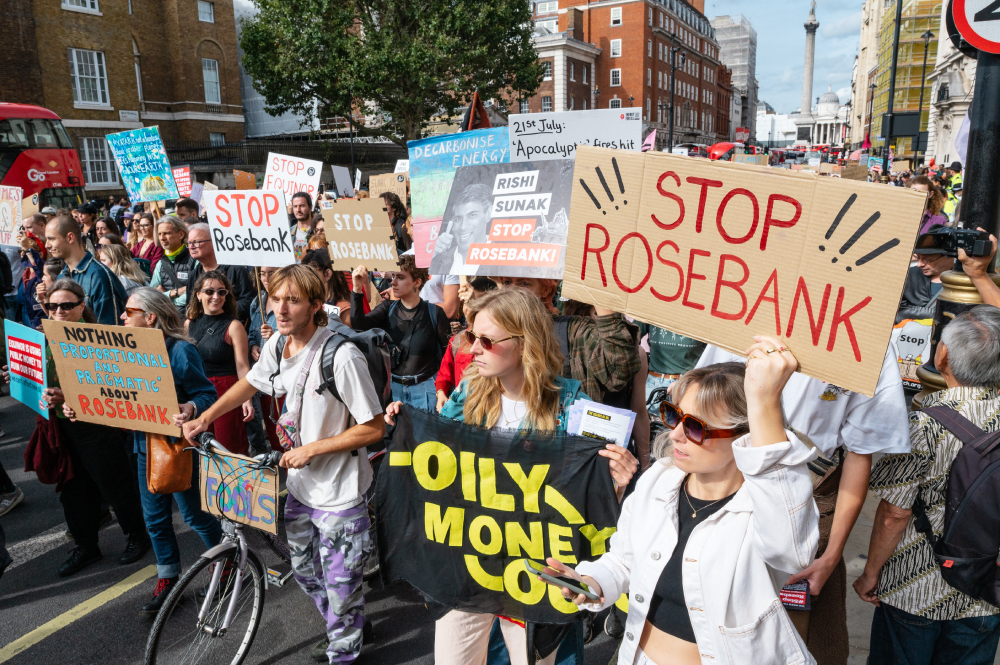UK Oil Field Approvals Reversed in Major Climate Victory
ELAW partners at Uplift and Greenpeace UK recently shared the good news that Scotland’s Court of Session has ruled the previous approval of the massive Rosebank and Jackdaw oil fields unlawful, delivering a much-needed climate win for 2025!
At an estimated 500 million barrels, Rosebank is the largest undeveloped oil field in the UK. Burning Rosebank’s reserves would produce more than the annual emissions of the 28 lowest-income countries in the world combined. The Jackdaw Oil and Gas Field in the Scottish North Sea would produce an estimated 2.76 million barrels of crude oil and condensate and 1.4 billion cubic meters of gas annually. In addition to the massive climate damage these projects would cause, the Rosebank project also threatens the Faroe-Shetland Sponge Belt Marine Protected Area.
“There is almost no public interest in developing the Rosebank oil field,” says Tessa Khan, Executive Director of Uplift. “Most of the oil would be sold on the international market for export and do nothing to lower bills or provide energy security for people in the UK. On top of that, the UK public would effectively carry almost all the costs of developing Rosebank, with the field’s owners receiving billions of pounds in tax breaks. Rosebank also won’t provide long-term security for the oil and gas workforce. Its drilling ship is currently being built in Dubai. Jobs supported by the oil and gas industry have more than halved in the past decade. Workers deserve better, which means governments coming up with a coherent transition plan for the North Sea and help for workers to move into good, clean energy industries that have a future. Rosebank is not the answer to energy security, lower bills, or jobs. It would simply make obscenely rich oil companies even richer while increasing the dangers for the rest of us.”
Ruling on the legal challenges brought forward by Uplift and Greenpeace UK, the Scottish Court of Session declared the approvals of the Rosebank and Jackdaw projects unlawful, as they should have accounted for the emissions that would be caused by burning the oil extracted from the field–also known as Scope 3 emissions.
Measures of Greenhouse Gas Emissions
Scope 1, 2, and 3 emissions are key concepts in understanding how a company’s greenhouse gas emissions are quantified.
Scope 1 covers emissions from sources that an organization owns or controls directly, such as natural gas flaring (burning off) at an oil field or gas leaks from pipelines.
Scope 2 emissions come from the energy a company purchases for operations, such as emissions from power plants that generate the electricity used at an oil field to power lights, equipment, etc.
Scope 3 encompasses emissions not produced by the company itself and are not the result of activities from assets owned or controlled by the company but that it is indirectly responsible for up and down its value chain. An example of Scope 3 emissions from an oil field is the emissions from the burning of gasoline, diesel, and other fuels refined from the oil extracted.
Shell (Jackdaw oil field developer) and Equinor and Ithaca (Rosebank oil field developers) must submit a new application that accounts for Scope 1, 2, and 3 emissions to develop these oil fields. The court has ruled that no oil and gas can be extracted unless or until they obtain new development consents from the UK Government, which has recently pledged not to issue any new oil and gas exploration licenses.
“Thank you to everyone who has supported the fight to stop Rosebank,” says Jack Robirosa, Legal Counsel at Greenpeace UK. “It’s our collective effort that has led to this victory today. We appreciate the support of the ELAW Science Team, which provided expert support on issues such as likely ecological and climate impacts.”
“Developing Rosebank and Jackdaw is incompatible with a safe climate,” says Dr. Johnnie Chamberlin, ELAW Scientist. “When we have already overshot agreed safe climate limits, its development would be a slap in the face for communities around the world already bearing the enormous costs of extreme weather.”
Using material in the EIAs for the project and UK regulations for offshore oil production, ELAW provided evidence that Greenpeace UK used to refute the initial claims of Shell that it would not be able to safely pause the development if the consent was quashed. ELAW is also providing guidance about how the amount and impact of Scope 3 emissions must be determined.
Congratulations to Uplift and Greenpeace UK on this exciting victory!

Bern Johnson
Executive Director
Environmental Law Alliance Worldwide
Read more:
The Guardian. January 30, 2025. Rosebank oilfield go-ahead decision ruled unlawful by Edinburgh court
BBC. January 30, 2025. New oil and gas field consent was unlawful – judge
Judgment. January 29, 2025.


